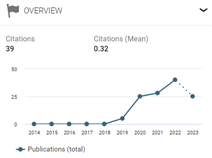Literature Review: peran vitamin D terhadap inflamasi pada kejadian sindrom ovarium polikistik (SOPK)
DOI: 10.30867/gikes.v5i3B.1910Abstract
Background: Polycystic Ovary Syndrome (PCOS) is an endocrine disorder affecting 5-18% of women of reproductive age, with a high prevalence in Europe and 1,8-15% in Indonesia. PCOS is often associated with chronic inflammation and vitamin D deficiency, which can exacerbate symptoms and increase the risk of cardiovascular disease due to the anti-inflammatory effects of vitamin D.
Objectives: To determine the role and most effective dosage of vitamin D in reducing inflammatory markers through a literature review.
Methods: The methodology employed is a Systematic Literature Review using the PRISMA method. A search in the Google Scholar, ScienceDirect, and Scopus databases yielded 1,046 articles, of which 7 RCT articles were selected for analysis. The selected articles investigate the effects of vitamin D on inflammation in PCOS, with a total population of 434 participants, published between 2019 and 2024, and were deemed suitable using The Joanna Briggs Institute (JBI) Critical Appraisal method.
Results: Out of seven randomized controlled trials (RCTs), five showed that vitamin D supplementation reduced levels of inflammatory biomarkers such as hs-CRP in patients with PCOS. Results varied depending on the dosage, but two specific dosages of vitamin D supplementation 4,000 IU and 50,000 IU showed potential as adjunctive therapy for managing PCOS.
Conclusion: Vitamin D supplementation is effective in reducing inflammation in PCOS and has potential as a beneficial adjunctive therapy with positive implications for the long-term health of patients. Dosages of 4,000 IU per day and 50,000 IU every two weeks have been proven effective in reducing PCOS-related inflammation. However, due to the limited number of studies reviewed, the most effective combination of micronutrients to be used alongside vitamin D has yet to be determined.
Keywords
Inflammation, Polycystic Ovary Syndrome, vitamin D
Keywords
Full Text:
PDFReferences
Al-Rasheed, N. M., Al-Rasheed, N. M., Bassiouni, Y. A., Hasan, I. H., Al-Amin, M. A., Al-Ajmi, H. N., & Mohamad, R. A. (2015). Vitamin D attenuates pro-inflammatory TNF-α cytokine expression by inhibiting NF-кB/p65 signaling in hypertrophied rat hearts. Journal of Physiology and Biochemistry, 71(2), 289–299. https://doi.org/10.1007/s13105-015-0412-1
Banait, T., Wanjari, A., Danade, V., Banait, S., & Jain, J. (2022). Role of High-Sensitivity C-reactive Protein (Hs-CRP) in Non-communicable Diseases: A Review. Cureus, 14(10), e30225. https://doi.org/10.7759/cureus.30225
Barrera, D., Díaz, L., Noyola-Martínez, N., & Halhali, A. (2015). Vitamin D and Inflammatory Cytokines in Healthy and Preeclamptic Pregnancies. Nutrients, 7(8), 6465–6490. https://doi.org/10.3390/nu7085293
Calcaterra, V., Verduci, E., Cena, H., Nutrients, V. M.-, & 2021, U. (2021). Polycystic ovary syndrome in insulin-resistant adolescents with obesity: the role of nutrition therapy and food supplements as a strategy to protect fertility. Mdpi.Com. https://www.mdpi.com/2072-6643/13/6/1848?furriel=07223007d0607aeff3ac066f3fb7a891ee2eb216
Craveiro, V., Araujo, J., Santos, A., & Ramos, E. (2019). Vitamin D - From the pro-hormone to the biological actions. Acta Portuguesa de Nutrição, 50–54. https://doi.org/10.21011/apn.2019.1909
Crommen, S., & Simon, M.-C. (2017). Microbial Regulation of Glucose Metabolism and Insulin Resistance. Genes, 9(1). https://doi.org/10.3390/genes9010010
ElObeid, T., Awad, M. O., Ganji, V., & Moawad, J. (2022). The Impact of Mineral Supplementation on Polycystic Ovarian Syndrome. Metabolites, 12(4). https://doi.org/10.3390/metabo12040338
Fatima, Q., Amin, S., Kawa, I. A., Jeelani, H., Manzoor, S., Rizvi, S. M., & Rashid, F. (2019). Evaluation of antioxidant defense markers in relation to hormonal and insulin parameters in women with polycystic ovary syndrome (PCOS): A case-control study. Diabetes & Metabolic Syndrome, 13(3), 1957–1961. https://doi.org/10.1016/j.dsx.2019.04.032
Jamilian, M., Foroozanfard, F., Rahmani, E., Talebi, M., Bahmani, F., & Asemi, Z. (2017). Effect of two different doses of vitamin D supplementation on metabolic profiles of insulin-resistant patients with polycystic ovary syndrome. Nutrients, 9(12), 1–13. https://doi.org/10.3390/nu9121280
Javed, Z., Papageorgiou, M., Deshmukh, H., Kilpatrick, E. S., Mann, V., Corless, L., Abouda, G., Rigby, A. S., Atkin, S. L., & Sathyapalan, T. (2019). A randomized, controlled trial of vitamin D supplementation on cardiovascular risk factors, hormones, and liver markers in women with polycystic ovary syndrome. Nutrients, 11(1). https://doi.org/10.3390/nu11010188
Jenkinson, C. (2019). The vitamin D metabolome: An update on analysis and function. Cell Biochemistry and Function, 37(6), 408–423. https://doi.org/10.1002/cbf.3421
Jin, A., Tang, X., Zhai, W., Li, Y., Sun, Q., Liu, L., Yang, X., Ren, H., & Lu, S. (2021). TSLP-induced collagen type-I synthesis through STAT3 and PRMT1 is sensitive to calcitriol in human lung fibroblasts. Biochimica et Biophysica Acta. Molecular Cell Research, 1868(10), 119083. https://doi.org/10.1016/j.bbamcr.2021.119083
Krentowska, A., & Kowalska, I. (2022). Metabolic syndrome and its components in different phenotypes of polycystic ovary syndrome. Diabetes/Metabolism Research and Reviews, 38(1), e3464. https://doi.org/10.1002/dmrr.3464
Maktabi, M., Chamani, M., & Asemi, Z. (2017). The Effects of Vitamin D Supplementation on Metabolic Status of Patients with Polycystic Ovary Syndrome: A Randomized, Double-Blind, Placebo-Controlled Trial. Hormone and Metabolic Research, 49(7), 493–498. https://doi.org/10.1055/s-0043-107242
Maktabi, M., Jamilian, M., & Asemi, Z. (2018). Magnesium-Zinc-Calcium-Vitamin D Co-supplementation Improves Hormonal Profiles, Biomarkers of Inflammation and Oxidative Stress in Women with Polycystic Ovary Syndrome: a Randomized, Double-Blind, Placebo-Controlled Trial. Biological Trace Element Research, 182(1), 21–28. https://doi.org/10.1007/s12011-017-1085-0
Ostadmohammadi, V., Jamilian, M., Bahmani, F., & Asemi, Z. (2019). Vitamin D and probiotic co-supplementation affects mental health, hormonal, inflammatory and oxidative stress parameters in women with polycystic ovary syndrome. Journal of Ovarian Research, 12(1). https://doi.org/10.1186/S13048-019-0480-X
Raja-Khan, N., Shah, J., Stetter, C., Sterility, M. L.-F. and, & 2014, U. (2014). High-dose vitamin D supplementation and measures of insulin sensitivity in polycystic ovary syndrome: a randomized, controlled pilot trial. Elsevier. https://www.sciencedirect.com/science/article/pii/S0015028214001745
Rashad, N. M., Abd El-Fatah, A. H., Lashin, M. E. B., Abomandour, H. G., & Allam, R. M. (2019). Impact of vitamin D supplementation on cardio-metabolic status and androgen profile in women with polycystic ovary syndrome: placebo-controlled clinical trial. Middle East Fertility Society Journal, 24(1). https://doi.org/10.1186/S43043-019-0005-Y
Saputra. (2019). Polycystic Ovary Syndrome (PCOS) Pada Remaja. https://sardjito.co.id/2019/09/30/polycystic-ovary-syndrome-pcos-pada-remaja/%0D
Talebi, S., Miraghajani, M., Hosseini, R., & Mohammadi, H. (2022). The Effect of Oral Magnesium Supplementation on Inflammatory Biomarkers in Adults: A Comprehensive Systematic Review and Dose-response Meta-analysis of Randomized Clinical Trials. Biological Trace Element Research, 200(4), 1538–1550. https://doi.org/10.1007/s12011-021-02783-2
Vieth, R., & Holick, M. F. (2018). Chapter 57B - The IOM—Endocrine Society Controversy on Recommended Vitamin D Targets: In Support of the Endocrine Society Position. In D. Feldman (Ed.), Vitamin D (Fourth Edition) (Fourth Edi, pp. 1091–1107). Academic Press. https://doi.org/https://doi.org/10.1016/B978-0-12-809965-0.00059-8
Zhao, J., Li, B., Medicine, Q. Z.-A. of P., & 2021, U. (2021). Vitamin D improves levels of hormonal, oxidative stress and inflammatory parameters in polycystic ovary syndrome: a meta-analysis study. Apm.Amegroups.Org. https://apm.amegroups.org/article/view/61538/html
Zuo, T., Zhu, M., Xu, W., Wang, Z., & Song, H. (2017). Iridoids with Genipin Stem Nucleus Inhibit Lipopolysaccharide-Induced Inflammation and Oxidative Stress by Blocking the NF-κB Pathway in Polycystic Ovary Syndrome. Cellular Physiology and Biochemistry : International Journal of Experimental Cellular Physiology, Biochemistry, and Pharmacology, 43(5), 1855–1865. https://doi.org/10.1159/000484074
Refbacks
- There are currently no refbacks.














